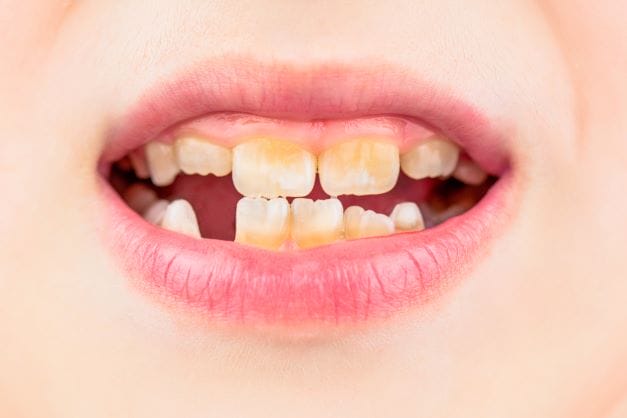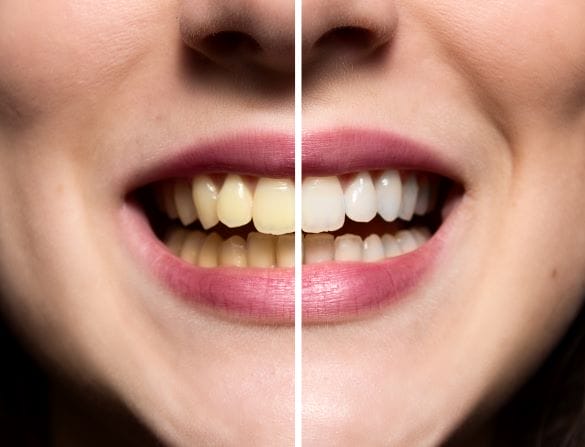Notably, discolored teeth are one of the sources of psychological concern to most people. They can reduce the quality of a smile and hinder the bearers of such teeth from confidently smiling in public spaces.
However, aside from aesthetic concern and putting an individual at some socioeconomic disadvantage, discolored teeth can also be associated with some health problems. Quite often, these health problems may pose serious harm later on and hence should be taken seriously.
That said, here are some of the potential health effects of discolored teeth according to one of the Renowned Dentist in Dubai.
It Can Habor Cavities
Often, discolored teeth may occur from poor oral hygiene, which causes the accumulation of food particles and bacteria in the form of plaques. Aside from discoloring the teeth’s enamel, the bacterial activities from the plaque can bore on the tooth and lead to the formation of cavities. Holes in the teeth are the last thing anybody would want to have, as they can predispose one to progressive bacterial invasion.
Secondary to discoloration, the bacteria thrive on sugary items and release acids capable of eroding the enamel. The erosion of the teeth’s enamel causes tooth decay and exposes the internal protected layers of the teeth to other complications.
Formation of the cavities can be prevented through professional dental and teeth whitening services. For instance, getting teeth whitening in Sheffield can help prevent this complication and get you a pearly set of teeth with an irresistible smile.
Inflammation Of The Gums
Medically known as gingivitis, this condition also traces to poor oral hygiene. Since poor oral hygiene is associated with plaque formation and is known to be a good host for bacteria and primer of the teeth for stain, the bacteria can advance based on proximity to the gums.
Gums are richly supplied with blood vessels. Hence, they can be sensitive to foreign invaders such as bacteria which can trigger the body’s inflammatory response. It presents itself as irritation, redness, and swelling of the gum, all of which cause pain to the individual.
If left untreated, the inflamed gum may aid the progression of bacteria and their acid into the underlying tissue and the bones. As a result, it may cause more severe health complications such as gum disease.
It Can Lead To Bad Breath
Bad breath, clinically known as halitosis, is another complication associated with discolored teeth. Discolored teeth create an environment that allows bacteria to thrive. Some of these bacteria can induce dryness in the mouth, thereby robbing it of the self-cleansing power of the saliva, which is required for the removal of food debris in the mouth.
Additionally, the bacteria can break down the remnant food particles and cause offensive odors to emanate from such mouths. One can agree that bad breath and discolored teeth can be a gruesome combination that could break the defense of a person’s confidence.
Demineralization Of The Enamel
Strong and healthy teeth are evidence of properly mineralized enamel. However, as dental plaques keep accumulating on discolored teeth, the associated bacteria release acids that wash away the mineral content of the enamel.

A demineralized tooth with a reduced possibility of remineralization may be highly subject to brittleness. Such a tooth may have an irregular rough surface that can easily fracture and cause more intense pain in the mouth.
Increased Sensitivity Of The Teeth
Some people with discolored teeth tend to brush more intensely and wear out the enamel, thereby exposing the inner layer covering the nerve-rich pulp. Because the inner layer contains a lot of nerve endings, the exposure can lead to increased sensitivity to certain stimuli from cold, hot, sugar, and acidic substances.
Potential Cause Of Respiratory Diseases
Usually, one of the causes of stains on discolored teeth is bacteria. These bacteria can multiply and overgrow the body’s defenses. In the process, they can be aspirated into the lungs as tiny droplets, which could lead to respiratory diseases like pneumonia.
Also, in individuals with pre-existing lung conditions like emphysema and chronic obstructive pulmonary disease, the inflammatory response from gingivitis secondary to discolored teeth can complicate the existing lung diseases.
Sign Of Other Medical Complications
Aside from general oral complications, discolored teeth can also be a sign of other health issues like a nutritional deficiency. Cases of certain immune deficiencies such as celiac disease and calcium deficiency are also evidenced by the discoloration of teeth.
Conclusion
Irrespective of the presented color, discoloration of the teeth could go beyond the aesthetic stigma it may put on the patient. It may be a sign of something bigger than what is seen or a lead-in to other systemic health complications. It necessitates the need for taking oral hygiene seriously and boosts the confidence that comes with smiling often.







